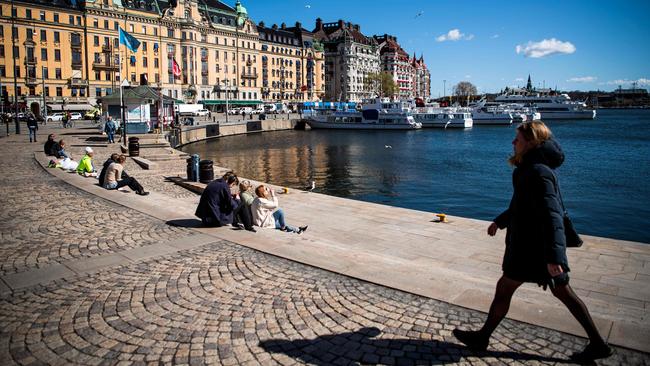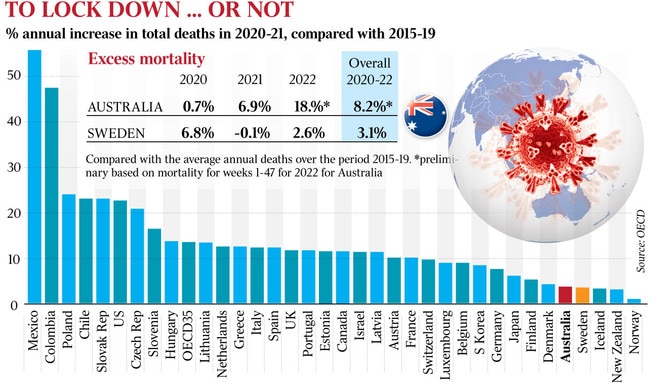Australia recorded relatively more ‘excess deaths’ during the Covid-19 pandemic than Sweden
Australia recorded relatively more ‘excess deaths’ during the pandemic than Sweden, new OECD analysis reveals.

Australia recorded relatively more “excess deaths” during the Covid-19 pandemic than Sweden, which chose not to lock down its populations, new analysis from the OECD reveals.
As the world approaches the three-year anniversary of the start of lockdowns this week, top academics say data showing Sweden’s success in keeping mortality rates down brings years of civil liberty restrictions and billions of dollars in government spending in other nations into question.
New OECD analysis comparing excess deaths in 2020 and 2021 – the two worst years of the pandemic – for 36 developed nations reveals Australia had the fifth lowest increase in excess deaths, but came in behind Sweden, which attracted global scorn for resisting closing businesses, schools and ordering citizens to stay at home.
Including excess deaths – defined as those over and above what was expected – for 2022 as well puts Australia even further behind Sweden with an 8.2 per cent increase over the three-year period compared with Sweden’s 3.1 per cent.
Stefano Scarpetta, the director of employment, labour and social affairs at the OECD, said: “If you control for population growth (higher in Australia), Australia’s excess deaths rate over the three-year period as a whole was 2.1 per cent and in Sweden it was -0.6 per cent, that is no excess mortality. The reason why we use excess mortality (instead of Covid-19 deaths) is because in practice counting the number of deaths because of Covid is very difficult.”
Dr Scarpetta said there were variations in classification and testing across countries, and it was difficult to determine whether elderly victims had died with or from Covid-19.

The OECD report, Ready for the Next Crisis? Investing in Health Care Resilience, found half of all Covid-19 deaths occurred among people aged 80 across 22 OECD countries with comparable data, and one third occurred in nursing homes.
Mexico and Colombia, which did impose lockdowns, endured the greatest increases in excess deaths of about 50 per cent. Japan and Sweden, the only two OECD nations to resist them, prompting international condemnation at the time, had among the lowest increases, ranking 4th and 8th, respectively.
Two US public health experts who in 2020 recommended the Swedish approach – Stanford University’s Jay Bhattacharya and Harvard’s Martin Kulldorff – said they felt vindicated but despaired at the lack of appreciation of the findings and feared the same policies would be followed again.
“The thing to emphasise is that Sweden has had one of the lowest excess mortalities in all Europe during the pandemic no matter how you cut the data,” Professor Bhattacharya said. “If lockdowns were necessary to prevent death it should have had one of the worst. Sweden served as a control group for the world in ethical pandemic management and it was a rousing success.”
He said the success Australia had in having “little Covid on the island for a full year came at tremendously high cost: 270 days of lockdown in Melbourne, essential imprisonment of the population”.
The underlying health of a country’s population (including rates of obesity), vaccination levels against Covid-19, and the capacity and quality of the available health care system best explained the widely different rates of excess deaths across countries, the OECD found.
Former US president Donald Trump in April 2020 said Sweden was “suffering badly” from its decision to follow its pandemic plan, but the US, where lockdowns pushed the jobless rate above 15 per cent in 2020, ended up with five times as many excess deaths as Sweden and the sixth worst outcome, according to the OECD data.
“Extended quarantining of healthy populations, the closing of schools, and massive violation of civil rights: these were never part of any pandemic plan that I’m aware of for respiratory viruses,” Professor Bhattacharya said.
Epidemiologists at the UK’s Imperial College, whose dire forecasts early in the pandemic convinced the UK and US to impose lockdowns in March 2020, forecast Sweden would endure 96,000 Covid-19 deaths by July 2020 if it didn’t follow China and then Italy in imposing lockdowns. After three years, Sweden has experienced 23,777 deaths from or with Covid-19, compared with Australia’s 19,477, according to the World Health Organisation.
Sweden’s population is older than Australia’s, with a median age of 41, compared with Australia’s 38.
“The principle of public health is that you can’t just focus on one disease; you have to look at cancer, cardiovascular disease and mental health,” Professor Kulldorff said.
He said Australia’s lockdowns had caused “huge collateral damage in public health, even if you ignore the impact on the economy and government finances”.
According to the IMF, Australia’s gross public debt as a share of GDP surged from 47 per cent to 59 per cent between 2019 and 2022, mainly as a result of federal and state stimulus programs that accompanied lockdowns, while Sweden’s public debt declined from 39 per cent to 31 per cent.
The OECD report found the number of in-person doctor consultations fell by an average of 17 per cent across OECD countries in 2020, and more than one in five people reported having forgone a needed medical examination.
Japan, whose then prime minster, the late Shinzo Abe, was also criticised for resisting a European-style lockdown of the densely populated island nation, had the lowest level of reported population sadness in 2020 (11 per cent), according to the OECD report, while Mexico and Colombia reported the highest, each above 30 per cent.
This new OECD analysis reflected the findings of the UK statistical agency, which found Sweden had the second lowest excess death rate in Europe.








To join the conversation, please log in. Don't have an account? Register
Join the conversation, you are commenting as Logout